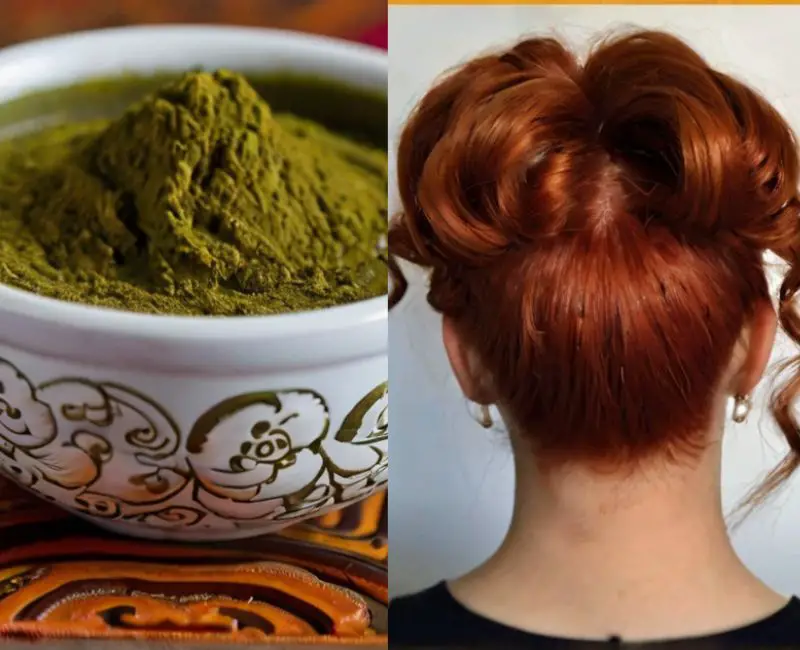A common inquiry persists: does henna hair dye damage hair?
Henna not only imparts rich color but also enhances hair strength and luster, appealing to those seeking a gentler coloring method.
Reports of dryness or brittleness post-application prompt scrutiny into its long-term effects on hair health.
Join us to get the complexities surrounding henna’s relationship with hair and discern the truth behind this age-old beauty practice.
How does henna hair dye work?
Henna hair dye, derived from the leaves of the Lawsonia inermis plant, has been cherished for centuries for its ability to color hair naturally, without resorting to harsh chemicals. Here’s a breakdown:
1. Natural Coloring
Henna contains natural pigments known as lawsone molecules, which are the key players behind its coloring prowess. These molecules have a special affinity for bonding with proteins, particularly those found in hair.
2. Activation
When henna powder is mixed with a mildly acidic liquid such as lemon juice or tea, it activates the release of lawsone molecules. This creates a thick paste, ready to be applied to the hair.
3. Hair Penetration
Once applied, the henna paste seeps into the hair shaft, forming bonds with the keratin protein present in the hair. Unlike conventional dyes that alter the hair’s internal structure, henna coats the outer layer of the hair shaft, forming a protective shield.
4. Color Formation
The lawsone molecules in henna undergo a chemical reaction with the proteins in the hair, resulting in the development of a red-orange color. The intensity of the color can vary based on factors such as henna quality, application duration, and the hair’s natural color.
5. Longevity
Henna’s color is semi-permanent and gradually fades over time as the hair grows and is washed. However, because henna forms a durable coating on the hair, its color tends to last longer compared to conventional dyes. Periodic touch-ups may be necessary to maintain the desired hue.
6. Hair Benefits
Apart from coloring, henna offers several advantages for hair health. It strengthens the hair, making it more resilient to damage and breakage. Henna also enhances hair shine and volume, lending it a healthy and vibrant appearance.
7. Natural Variations
It’s worth noting that the final color result of henna can vary depending on factors like the hair’s original color, the quality of the henna powder, and any additional ingredients used. Some henna products may also include botanical extracts or herbs to augment its conditioning properties or modify the eventual color outcome.
In essence, henna hair dye stands as a natural and gentle alternative to conventional hair dyes, offering not just beautiful color but also nourishment and fortification for the hair.
Does henna hair dye damage hair
Henna hair dye is celebrated for its gentle nature and is often perceived as less harmful to hair compared to traditional chemical dyes.
- Protective Coating
Unlike chemical dyes that alter the hair’s structure, henna forms a protective layer around each strand. This coating can strengthen the hair, shielding it from environmental damage and reducing moisture loss.
- Natural Composition
Derived from the Lawsonia inermis plant, henna lacks harsh chemicals like ammonia and peroxide found in synthetic dyes. This renders it a safer choice for those with sensitive scalps or allergies to conventional dye ingredients.
- Conditioning Benefits
Henna boasts natural conditioning properties that enhance hair health and appearance. It can impart shine, smoothness, and manageability, resulting in visibly healthier-looking hair.
- Potential for Dryness
While henna provides conditioning benefits, some users may experience slight dryness, particularly with frequent or prolonged use. Counteracting this effect with a moisturizing conditioner or oil treatment post-henna application is advisable.
- Color Results
As henna coats the hair rather than penetrating deeply, its ability to cover gray hair or produce drastic color changes may be limited compared to chemical dyes. However, for those desiring natural-looking red or copper tones, henna is an excellent choice.
- Quality Assurance
The purity and quality of the henna product can influence its impact on hair health. Low-quality henna powders may contain additives or metallic salts that could lead to dryness or damage, emphasizing the importance of opting for pure, high-quality henna from reputable sources.
In essence, while henna hair dye is generally deemed less damaging than chemical alternatives, its effects on hair health may vary based on application techniques, frequency of use, and individual hair characteristics.
Addressing Concerns:
When it comes to using henna hair dye, it’s common to have questions and concerns. Here’s of the most common worries to ensure a positive experience:
- Color Outcome
Many wonder if henna can provide the desired color. While it typically imparts red or copper tones, results may vary based on factors like hair color and henna quality. To ensure satisfactory results, it’s wise to conduct a strand test and purchase high-quality henna from reputable sources.
- Dryness
Concerns about dryness after using henna are valid. While henna does offer conditioning benefits, it can lead to dryness if not followed by proper care. To combat this, incorporate moisturizing products into your routine post-henna application.
- Gray Coverage
Can henna effectively cover gray hair? While it can add color to gray strands, coverage may not be as consistent as with chemical dyes. Consider using henna-indigo blends or multiple applications for better coverage.
- Color Longevity
Worried about how long henna color will last? While it’s semi-permanent and fades gradually, longevity depends on factors like application and hair care. To maintain color intensity, use gentle products and consider touch-up applications.
- Allergic Reactions
Allergic reactions to henna are rare but possible, especially with low-quality products. To reduce the risk, conduct a patch test beforehand and opt for pure henna from trusted sources.
- Compatibility with Chemical
Wondering if henna is safe after chemical treatments? While generally fine, it’s best to wait a few weeks between treatments to let your hair recover fully.
By addressing these concerns and taking proper precautions, you can enjoy the benefits of henna hair dye with confidence, achieving beautiful, healthy-looking hair.
Practical Tips for Safe Usage:
For a successful and safe experience with henna hair dye, consider these practical tips:
- Before applying henna all over your hair, conduct a patch test on a small area of skin to check for allergic reactions. Apply a bit of henna paste and wait 24-48 hours to see if any irritation occurs.
- Select pure, high-quality henna powder from trusted sources, avoiding products with additives or metallic salts. Research suppliers and read reviews to ensure you’re getting a safe product.
- Read and follow the instructions provided with your henna product carefully. Mix the henna powder with a mildly acidic liquid, like lemon juice or tea, and let it sit for the recommended time for optimal color.
- Apply a barrier cream around your hairline, ears, and neck to prevent henna from staining your skin. Consider wearing gloves during application to protect your hands.
- Test the color on a small strand of hair before applying henna all over. This helps ensure the final color meets your expectations.
- Section your hair and apply the henna paste evenly from roots to ends, ensuring each strand is fully saturated. Use an applicator brush for precise application and avoid overlapping areas.
- Allow the henna paste to sit on your hair for the recommended time. Cover your hair with a shower cap to keep it moist and aid color development.
- After the processing time, rinse the henna out of your hair with lukewarm water until the water runs clear. Avoid shampooing immediately afterward, as it may strip away some color.
- Henna can be drying, so follow up with a deep conditioning treatment or hair oil to restore moisture and keep your hair hydrated.
By following these tips, you can safely achieve beautiful, vibrant color with henna hair dye while maintaining the health of your hair.
Real Stories and Experiences:
Taanisha’s foray into henna hair dye left her pleasantly surprised by the vibrant red color and enhanced softness of her hair. Now a dedicated user, she enthusiastically shares her positive experiences, encouraging others to explore natural alternatives for achieving beautiful and healthy hair.
Read More Hair Color Post: Will Vitamin C Remove Hair Dye
FAQ:
Q. is it safe to dye your hair with henna?
Using henna for hair coloring is generally safe since it’s a natural, plant-based dye without harsh chemicals. However, ensure you’re using pure henna and perform a patch test to prevent allergic reactions.
Q. is it sunnah to dye your hair with henna?
Yes, dyeing hair with henna is encouraged by the Sunnah, the traditions of the Prophet Muhammad (peace be upon him). It’s culturally and religiously significant in many Muslim communities as a beautification practice.
Q. How Long Does Henna Hair Color Last?
Henna hair dye can last between four to six weeks, depending on factors like application technique, hair type, and maintenance routine. Over time, the color gradually fades with hair growth and washing.
Q. Can Henna Cover Gray Hair Completely?
While henna can add color to gray hair, complete coverage may vary, especially with lighter shades. Consider using henna-indigo blends or multiple applications for better coverage results.
Q. Is Henna Safe for Chemically Treated Hair?
Henna is generally safe for use on chemically treated hair, but it’s advisable to wait at least four to six weeks between treatments for full hair recovery. Conduct a strand test to ensure compatibility and desired color outcome.
Last Call:
- By and large, henna tends to fortify the hair structure, creating a protective layer that can enhance resilience and diminish breakage. Its natural pigments deliver vibrant hues without resorting to harsh chemicals, making it especially appealing for individuals with sensitivities to conventional dyes.
- Some users may encounter dryness or lackluster results, especially with frequent or prolonged henna use. To counteract this, it’s crucial to follow up with moisturizing treatments and maintain a well-rounded hair care regimen.
- Through selecting high-quality henna, conducting patch tests, and employing proper application techniques, individuals can reap the benefits of henna while mitigating potential risks to hair health.
- Henna offering a natural and sustainable alternative for coloring hair while concerning strength and vitality.
Call to action:
- If you’ve found this blog enlightening and valuable, Follow us on Pinterest to stay abreast of the latest trends and insights, not only regarding henna hair dye but also on various related topics.
- Share your comments, inquiries, and personal anecdotes in the comment section below. Your contributions not only enrich our community but also serve as a guiding light for others exploring on their journey to healthier, more radiant hair.


